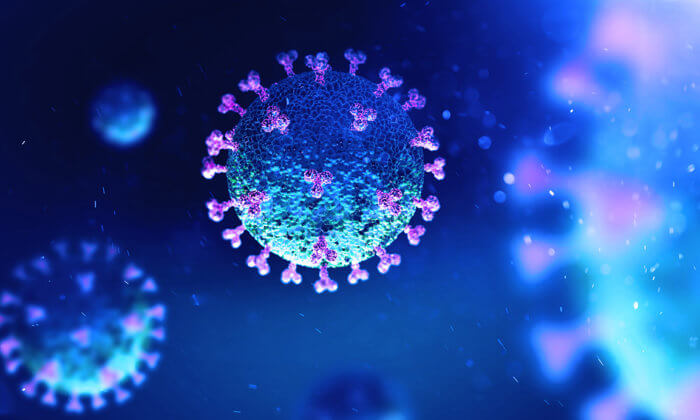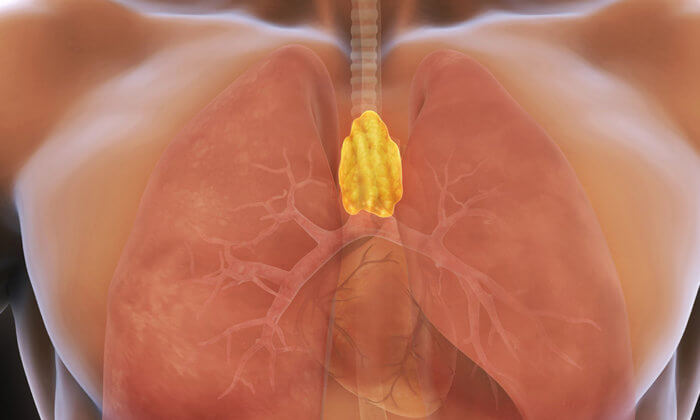Glutathione and NAC Reduce the Severity of COVID-19
Can two common antioxidant supplements lower the impact of coronavirus infection and speed up recovery?
| | Reading Time: 5 minutes
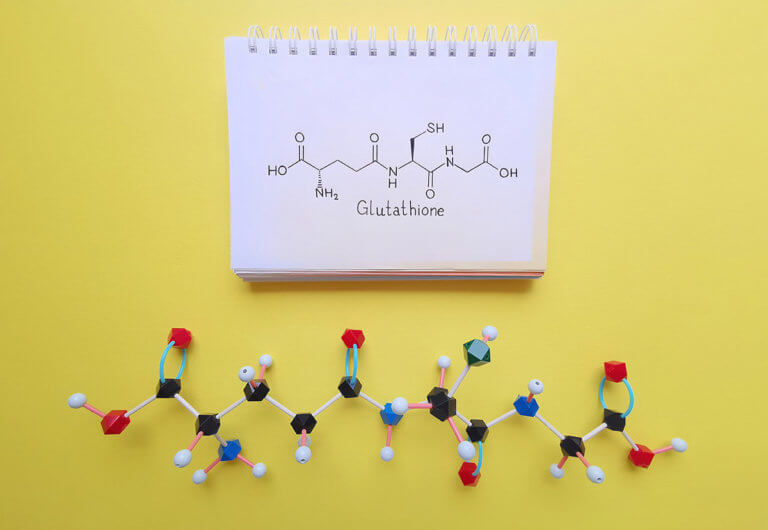
We’ve accepted that avoidance and prevention are critical for not getting infected, but if you get COVID-19 and coronaviruses swarm your cells, are there ways to bend the curve? First, follow the basic rules, including enough rest and drinking plenty of fluids, wearing a mask, washing your hands, wiping surfaces, and avoiding crowds. And, take immune-boosting supplements like zinc.
However, there’s more to it than necessary prevention like wearing a mask. Dodging a bullet is essential, but stopping the bleeding once you get shot is critical. That’s why you need a comprehensive approach to reduce the severity of COVID-19 should you get infected.
For effective treatment, there are both frontline and backend strategies. Frontline strategies include boosting immunity with zinc, vitamin C, and Beta (1,3/1,6) D-Glucan. Active backend strategies include taking antiviral compounds, dampening inflammation, and supporting antioxidative functions.
Antioxidants play critical roles in managing inflammation and holding back viral infections. Vitamins C and E, glutathione, and N-acetyl-L-cysteine are antioxidants with antiviral activity against respiratory infections like influenza and have been helpful with COVID-19.
Enhance Redox
One crucial strategy for beating COVID-19 is to enhance your redox homeostasis. Redox is short for oxidative-reduction reactions, a type of chemical reaction that transfers electrons. Your body enlists redox in many biochemical reactions. For example, your metabolic system uses redox reactions to convert food plus oxygen to energy.
Viral infections, like SARS-CoV-2 that cause COVID-19, can induce massive reactive oxygen species (ROS) that lead to severe tissue injury. Viruses alter redox balance within infected cells leading to inflammation and tissue damage. A robust redox reaction can beat back the damaging effects of viral infections.
Recharge Glutathione Status
Glutathione (GSH) is an important cellular antioxidant. It’s abundant in all our cells, but mostly in our liver and the lining of the respiratory tract. It makes sense that glutathione is vital in helping our body resolve viral infections.
GSH plays roles in detoxifying toxic compounds, protein folding, the regeneration of vitamins C and E, maintenance of mitochondrial function, antiviral defense, the regulation of cellular proliferation, apoptosis, and the immune response.
Glutathione deficiency is associated with accelerated aging and many chronic diseases, including diabetes, heart and lung diseases, liver disease, and cancer. And glutathione deficiency may contribute to severe COVID-19 infection.
During viral infection, increased viral replication leads to a higher viral load causing significant oxidative damage to lung tissue. It’s also associated with the high levels of inflammation responsible for ARDS (acute respiratory distress syndrome) and the greater likelihood of dying from SARS-CoV-2.
Researchers found that men have a higher risk of severe COVID-19 infection than women. Other risk factors include a history of smoking, prior chronic medical conditions, immune deficiency, and those older than 65. An Italian study found glutathione particularly useful in preventing severe respiratory disease in elderly patients.
Keeping your cellular level of reduced glutathione high is vital for health and immunity. Optimal GSH levels may even improve your body’s response to viral infections and help beat COVID-19.
Recharge your glutathione status with GSH supplements and by intravenous infusions. If you get SARS-CoV-1, the most effective way to boost GSH is with IV therapy. A slow drip of 4,000 mg is sufficient to raise glutathione blood levels. Maintain optimal levels of total glutathione with oral supplements. Take 100-200 mg four times daily of reduced glutathione.
I like to have objective markers for my patients, biological measurements to map progress. Before you start glutathione supplements, get tested. Both Quest Diagnostics and LabCorp offer a total glutathione blood test. The reference range for Quest is 544-1228 µg/mL. The LabCorp range is 176-323 µg/mL. Aim to have your glutathione level in the upper end of the spectrum. Genova Diagnostics offers an oxidative stress analysis that includes a reduced glutathione level.
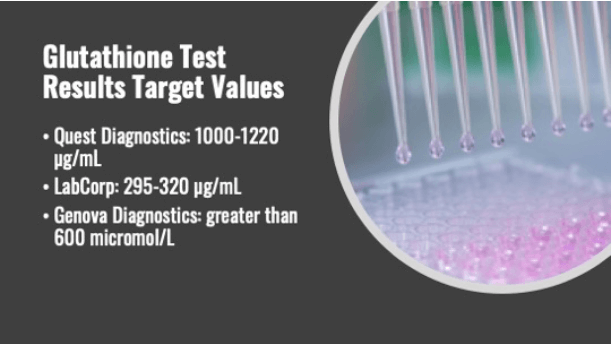
NAC (N-Acetyl Cysteine) Supports Glutathione
NAC is s precursor of reduced glutathione. In the clinic, we prescribe it orally or inhaled using a nebulizer to thin mucus in chronic respiratory diseases. It also improves liver function. And it may prevent and treat influenza. NAC is necessary to maintain healthy glutathione levels, so oral supplementation makes sense. Take 600 mg twice daily.
Another benefit of NAC is the reduction of the Von Willebrand Factor (vWF). COVID-19 patients tend to have abnormal blood coagulation, leading to deep vein thrombosis, pulmonary embolism, stroke, and microthrombotic complications like COVID toe. Also, the incidences of thrombotic events increase with age. NAC reduces the size and activity of vWF helping prevent clots.
Though not well-understood, clinicians and researchers find that SARS-CoV-2 has unique properties that increase thrombosis risk. NAC’s value in supporting glutathione’s antioxidant effect, thinning phlegm, and promoting healthy blood coagulation may be useful in treatment COVID-19.
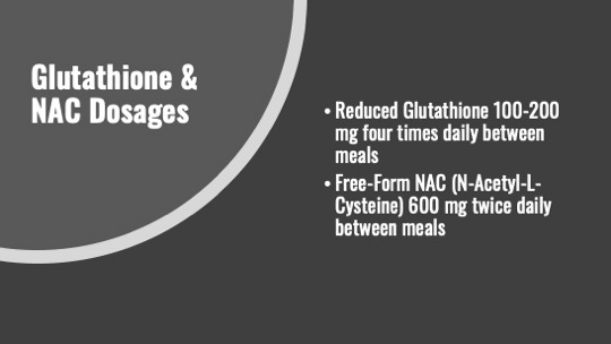
Consider This
An April 2020 review from The Center for Evidence-Based Medicine (CEBM) at Oxford University found few clinical trials to support the use of glutathione supplements for coronavirus infection. But acknowledged it was difficult to draw concrete conclusions one way or the other about the use of antioxidants for COVID-19. However, the Oxford researchers admitted the science is solid on glutathione and NAC’s ability to combat oxidative stress and inflammation associated with active viral infections, including influenza A. Why not coronaviruses?
In my professional opinion, even though the research for the treatment of coronaviruses with antioxidants is not as strong as I’d like, there’s enough evidence on the biochemistry of antioxidants and for the use in treating influenza. Therefore, it makes sense to try glutathione and NAC in the treatment of COVID-19 as a disease modification strategy to promote viral immunity. They may make a critical difference in the outcome of COVID-19 infection.
Glutathione and NAC are repurposed supplements that have antioxidant benefits for the respiratory system and exert a positive effect on blood coagulation. From my clinical experience, glutathione and NAC supplements are safe. However, they are not specific against coronaviruses but serve as part of a strategy to bend the COVID-19 curve.
Updated 07/17/2020 19:40hs
INSTAGRAM LIVE Q&A
Ver esta publicación en Instagram
Selected References
Cai, J., Chen, Y., Seth, S., Furukawa, S., Compans, R. W., & Jones, D. P. (2003). Inhibition of influenza infection by glutathione. Free Radical Biology and Medicine, 34(7), 928–936. https://doi.org/10.1016/S0891-5849(03)00023-6
Checconi, P., Salzano, S., Bowler, L., Mullen, L., Mengozzi, M., Hanschmann, E. M., Lillig, C. H., Sgarbanti, R., Panella, S., Nencioni, L., Palamara, A. T., & Ghezzi, P. (2015). Redox proteomics of the inflammatory secretome identifies a common set of redoxins and other glutathionylated proteins released in inflammation, influenza virus infection and oxidative stress. PLoS ONE, 10(5), 1–21. https://doi.org/10.1371/journal.pone.0127086
Glinsky, G. V. (2020). Tripartite combination of candidate pandemic mitigation agents: Vitamin D, Quercetin, and Estradiol Manifest properties of medicinal agents for targeted mitigation of the COVID-19 pandemic defined by genomics-guided tracing of SARS-CoV-2 targets in human cells. Biomedicines, 8(5). https://doi.org/10.3390/BIOMEDICINES8050129
Guillin, O. M., Vindry, C., Ohlmann, T., & Chavatte, L. (2019). Selenium, selenoproteins and viral infection. In Nutrients (Vol. 11, Issue 9). https://doi.org/10.3390/nu11092101
Horowitz, R. I., Freeman, P. R., & Bruzzese, J. (2020). Efficacy of glutathione therapy in relieving dyspnea associated with COVID-19 pneumonia: A report of 2 cases. Respiratory Medicine Case Reports, 30, 101063. https://doi.org/10.1016/j.rmcr.2020.101063
Polonikov, A. (2020). Endogenous Deficiency of Glutathione as the Most Likely Cause of Serious Manifestations and Death in COVID-19 Patients. ACS Infectious Diseases. https://doi.org/10.1021/acsinfecdis.0c00288
Uchide, N., & Toyoda, H. (2011). Antioxidant therapy as a potential approach to severe influenza-associated complications. Molecules, 16(3), 2032–2052. https://doi.org/10.3390/molecules16032032
Yatmaz, S., Seow, H. J., Gualano, R. C., Wong, Z. X., Stambas, J., Selemidis, S., Crack, P. J., Bozinovski, S., Anderson, G. P., & Vlahos, R. (2013). Glutathione peroxidase-1 reduces influenza A virus-induced lung inflammation. American Journal of Respiratory Cell and Molecular Biology, 48(1), 17–26. https://doi.org/10.1165/rcmb.2011-0345OC
For More Information:
- See my other blogs on COVID-19 prevention and protection
- Order pharmaceutical grade supplements
- Check out my books Viral Immunity and Beating the Flu
- Sign up for my Friday Q&A on natural health
